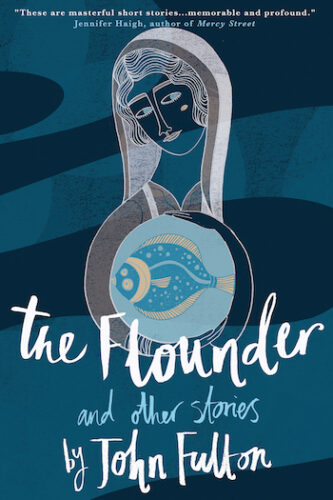Book Review: John Fulton’s “The Flounder” — A Testament to Human Resilience
By Roberta Silman
In The Flounder, John Fulton is clearly at the top of his game. His prose has that rare thing — a sense of intimacy.
The Flounder and Other Stories by John Fulton. Blackwater Press, 201 pages, $18.99
 Just after reading Surgeon General Vivek Murthy’s essay on the epidemic of loneliness and isolation in America today (New York Times, May 3) I received a copy of John Fulton’s newest collection of stories, The Flounder. In 10 beautiful stories he reveals a profound understanding of loneliness in all walks of life and among people of all ages. Kids struggling with sick parents or trying to help a single mother survive, a young man haunted by the memory of a mother who dropped him off at his grandfather’s and disappeared, a wife of many years who can’t bear to let go of her dying husband, lovers whose expectations of marriage and sex are mystified that so much can go wrong, and even a man who seemed to have appeared mysteriously from a story by F. Scott Fitzgerald, a man totally flummoxed that his once charmed life has left him so alone at the end. Fulton is especially good at creating characters who are on the verge of adulthood — young people in late teens or early 20s who are moving out into the world, sometimes from troubled and/or claustrophobic childhoods. All with an uncanny ability to persist that is a testament to human resilience.
Just after reading Surgeon General Vivek Murthy’s essay on the epidemic of loneliness and isolation in America today (New York Times, May 3) I received a copy of John Fulton’s newest collection of stories, The Flounder. In 10 beautiful stories he reveals a profound understanding of loneliness in all walks of life and among people of all ages. Kids struggling with sick parents or trying to help a single mother survive, a young man haunted by the memory of a mother who dropped him off at his grandfather’s and disappeared, a wife of many years who can’t bear to let go of her dying husband, lovers whose expectations of marriage and sex are mystified that so much can go wrong, and even a man who seemed to have appeared mysteriously from a story by F. Scott Fitzgerald, a man totally flummoxed that his once charmed life has left him so alone at the end. Fulton is especially good at creating characters who are on the verge of adulthood — young people in late teens or early 20s who are moving out into the world, sometimes from troubled and/or claustrophobic childhoods. All with an uncanny ability to persist that is a testament to human resilience.
In “Budapest,” which may be my favorite, two 19-year-olds meet on a train going to Budapest soon after the Berlin Wall has come down and the city is throwing off the shackles of Communism. The boy — for he is still very much a boy — is Leland, from Draper, Utah. The girl is S (her name is unpronounceable), from Brussels. He is wandering around Europe on a Eurail Pass, she is there for an audition as a violinist in a prestigious orchestra. On its face this story is about the collision of cultures, but as we get to know these very real kids, it turns out that they have much in common. What is amazing is that their meeting and short time together will mark them for life; after it they will better understand not only each other but themselves. Here they are at the beginning:
…most of the passengers had fallen asleep as the young woman told Leland that she loved music. But she could not be sure how she felt about the violin, which had been forced on her. Every time she picked up the instrument, she felt her mother’s resentment for her father. He’d always been cold. The English often are. But he had done something else, too. Years ago, he had taken a mistress whom he still had now. As a result, his mother — a very capable, ambitious woman, who had sacrificed a career in music herself to be a wife and raise a family—had become single-mindedly dedicated to her children.
She shook her head and smiled apologetically. You mentioned you were escaping your home, she said now. What is it that you need to get away from?
He told her that she’d have to see Draper to understand, and he described the arid mountain range that was half made of salt so that no trees and only the ugliest, spiniest plants and bushes could grow. And there was his church, the Mormon church — six hours of service every Sunday, the prayer meetings with elders, the general discouragement of thinking and reading, both of which Leland liked to do. But finally, he also came to his mother: she had been left by his father before Leland could remember and she’d held onto a resentment and bitterness from which she never recovered and for which, one way and another, Leland had been trying to compensate ever since. He had come home to be with her every day after school. He had stayed in at night, not living like most teenagers would, even teenagers in Draper. If he were honest, he was really trying to escape her.
Bonded by their similar pasts, these two stay in the same pensione, make their way through the city where Leland is continually teased about his very American bright blue sneakers, go to S’s audition and the famous Turkish baths, lie side by side at night talking and touching and dreaming. By the end they have shared — with a poignant tenderness rare in contemporary writing — their hopes and dreams, while also shedding part of their identities. It is a wonderful story of discovery and longing with twists and turns I will not reveal; but as you read you feel Fulton’s sly wit as well as his great affection for his characters as they open up to a much larger world than they ever imagined when they were young.

Author John Fulton.
The other standout is the title story, “The Flounder.” It begins in a very ordinary way: “Despite the fact that Marian had told Daniel the night before their trip to France that she had slept with someone at her conference that weekend, that she was sorry, very sorry, and regretted it, and that Daniel didn’t feel much like going anywhere with her now, they left early the next morning.” But as Fulton gets into Daniel’s head, the narrative takes leaps that are remarkable and magical proving that, in the right hands, the most banal beginning and the most ordinary of circumstances — eating a marvelous meal in a small hotel and exploring the French countryside and recalling a well-known folktale — can create its own mystery, where the riddles of human relationships are revealed as unbelievably complicated but also unbelievably simple. The tension between these two young people makes for a compelling trajectory, filled with surprises and a kind of healing that only a master can achieve. As Marian and Daniel encounter strangers who have their own stories, they grow in a way that seemed impossible when they began this weekend journey.
Fulton, who directs the MFA program at the University of Massachusetts in Boston, is the author of three previous books of fiction (two books of stories, and one novel), all of which have been critically acclaimed. In The Flounder he is clearly at the top of his game. His prose has that rare thing — a sense of intimacy. And his vision leaves one with a profound sense of peace and hope that most of these wonderfully “round” characters will somehow find their way.
Roberta Silman is the author of five novels, a short story collection, and two children’s books. Her latest, Summer Lightning, has been released as a paperback, an ebook, and an audio book. Secrets and Shadows (Arts Fuse review) is in its second printing and is available on Amazon. It was chosen as one of the best Indie Books of 2018 by Kirkus and it is now available as an audio book from Alison Larkin Presents. A recipient of Fellowships from the Guggenheim Foundation and the National Endowment for the Arts, she has reviewed for the New York Times and Boston Globe, and writes regularly for the Arts Fuse. More about her can be found at robertasilman.com, and she can also be reached at rsilman@verizon.net.
